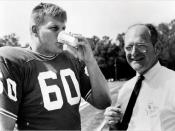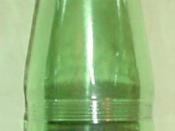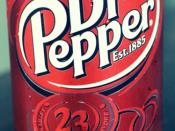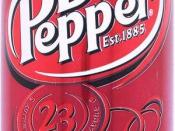The Drink That Will Change Your Life! Wouldn't be great to be someone different? In today's world of advertising many advertisers are trying to make the average consumer feel as if being someone else is possible. The advertisers behind "Gatorade", "Tropicana", and "Dr. Pepper" use this type of advertising to attract buyers to their products. The following commercials are perfect examples of how advertisers exploit consumers. The advertisers achieve this by making them feel as if buying the product will change how they are perceived in society.
Gatorade For years people have purchased the sports drink "Gatorade" in hopes of proving athletic performance. Why are people so determined that "Gatorade" will make them a better athlete? Hidden deep within the newest television commercial for Gatorade lays several subliminal messages delivered towards the consumer. This form of advertising may very well be the reason why Gatorade is so popular.
The commercial is basically a story about how "Gatorade" was created. It tells how the University of Florida's football team drank Gatorade and won the Orange Bowl.
The commercial begins with the narrator saying, "The legend was born in 1965 in the swamps of Florida." This sets up the fairy tale that is the entire commercial. It paints a picture of hot, sweaty, unbearable conditions that are barley tolerable by football players. However, football players can testify that no matter where they play, they will always be hot and sweaty. They could be in Florida, Texas, or Nebraska and they will still sweat. The commercial plants an image into the viewers heads that makes them feel as if playing football in Nebraska is much worse than playing football anywhere else. However, in reality the differences are very minor. The commercial later expounds on this idea saying that, "The Gators thrived in conditions which would a salamander sweat." The advertisers are once again trying to pound that image of hot, sweaty conditions into the viewer's head.
The commercial continues to tell the story about how the Florida Gators football team wasn't adequately hydrated, and how the U of F doctors created "Gatorade" to fix the problem. The coach of the 1965 Gator football team states that the Gators became a "second-half" team. Then the commercial tells the viewer that the Florida Gator football team won the orange bowl in 1967. The viewer of the commercial is given the idea that the Gators won the Orange Bowl because of the "Gatorade". However, why didn't the Gators win in 1965 when they first received "Gatorade"? Why didn't they win in 1966? The commercial never actually states that the Gators won because of "Gatorade". It hints that they do, but never actually says it. Perhaps, the reason that won the Orange Bowl was because they had better players that year, or because of better coaching. The commercial never says for sure, but it does so for a reason. The advertisers want the viewer to think that "Gatorade" is the one and only reason for the team's success. This approach to advertising is very convincing. This might have something to do with why "Gatorade" is the "Most researched sports drink in the world ("Gatorade - A True Story".) The commercial ends with the question, "Is it in you?" This final question makes viewers feel that "Gatorade" should be in them. The viewers feel as if they should need to drink "Gatorade" if they want to be a successful athlete. Though the picture painted by the advertisers may seem accurate, the viewers must keep in mind that not all great athletes drink "Gatorade." This commercial is marketed towards young, athletic males. The commercial usually airs during sporting events. So the next time the question is asked, "Is it in you?" be sure to ask, "Why should it be?" Dr. Pepper Hundreds of thousands of consumers each year buy products to stimulate their emotions hoping the product will help them feel a certain way. Consumers are also drawn to products that will improve one's appearance. Young & Rubicam, the ad agency responsible for the Dr. Pepper commercial titled "Garth Music", understood the appeal of such emotional and psychological changes and targeted consumers by creating the appearance that buying a Dr. Pepper would make a person happier and more attractive.
The Dr. Pepper commercial opens with the famous Garth Brooks, strumming his guitar and singing the words, "There's a light in your soul." The advertisers hope by playing an upbeat, happy song, the consumer will associate good feelings with the product. A few seconds afterwards, a flock of fit and attractive women come and join Garth and his band. The advertisers want the consumer to believe that the women were drawn to the band because the band had Dr. Peppers.
When the women arrive at the scene, Garth grabs several Dr. Peppers and hands each of the women a drink. The group begins to gulp down the Dr. Pepper while in the background, the upbeat music gives the consumer the feeling the soft drink is making Garth's band and the women happier. By creating the image that women are pleased and happier when drinking a Dr. Pepper, the advertisers put out the idea that women can be attracted and pleased by a cold Dr. Pepper. For the remainder of the commercial, the band and the group of women are sitting in a large semicircle appearing like they are having a great time. The scene lets the consumer see how drinking Dr. Pepper can make one enjoy life more.
Near the end of the commercial, Garth closes the song by singing, "Be you, do what you do. Be an individual, like Dr. Pepper." Advertisers hope that consumers will be drawn towards Dr. Pepper. The want the consumers to feel as if drinking Dr. Pepper will individualize them. The advertisers also give the consumer the message that Dr. Pepper should be part of their everyday routine. By painting the picture of happiness and individuality, the advertisers provide many reasons for consumers to purchase an ice cold Dr. Pepper. The reasons include: happiness, attractiveness, and individuality for the consumer. The advertisers who created the commercial did an effective job of lumping several selling points into a single commercial.
While creating the commercial, the advertisers were trying to sell their product to males, which are more susceptible to advertising that utilizes attractiveness to the opposite sex. Men are also drawn more towards products that will help them have a better experience. To market to men, the advertisers usually ran the "Garth Music" commercial on MTV and sporting events to ensure that a large male population would view the ad. Perhaps Dr. Pepper's clever marketing strategies are what helped them to become the world's oldest major soft-drink ("Pepper Facts".) Tropicana Tropicana Pure Premium Orange Juice is a nationally known product owned by Pepsi-Cola Company Incorporation. "I Think I'll Walk," is the name of one commercial that advertises this product. Pepsi-Cola Company tries to set the impression in this commercial for their viewers to believe that by drinking Tropicana Pure Premium Orange Juice, he or she will become more energetic, stress-free and unchained from everyday trials and tribulations. Additionally, they are trying to promote their new bottle. The viewers are aware of this because the narrator states, "The new re-sealable bottle of Tropicana Pure Premium is now good to go." "I Think I'll Walk," is primarily a commercial about a man who burst into a song and dance a number after drinking Tropicana Pure Premium Orange Juice.
The commercial begins with a man standing in front of a window at his work place. The viewer is aware that the background is a professional workplace because the man is in a dress suit and computers are on office desks. The man takes a drink of Tropicana Pure Premium Orange Juice and he is suddenly outside. He then begins to sing, "I think I'll walk outside, the summer sun is calling my name." Next, he proceeds to walk down the sidewalk followed by young girls. The advertiser is trying to have the viewers to vision that it doesn't matter about age, Tropicana Pure Premium Orange Juice assures happiness and energy for everyone. Further more, the advertisers are trying to have the viewers to believe that it doesn't matter how you are feeling: bored, happy, or sad Tropicana Pure Premium Orange Juice is the medication for you to start feeling better than ever.
The commercial continues to show how Tropicana Pure Premium Orange Juice assures enthusiasm, stress-free from life and happiness by showing the man (from the office) standing in front of a building where construction workers are at work. He continues to dance and sing with the construction workers imitating everything he does. This scene is concluded with the man doing a cartwheel off the set. In the next scene, he is leaping across cars as he grasps his bottle of Tropicana Pure Premium Orange Juice tightly. He then leaps into the middle of the freeway with males and females of all ages, and ethnic backgrounds holding a bottle of Tropicana Pure Premium Orange Juice behind him. The advertisers are trying to elaborate on their point to their viewers in which it doesn't matter his or her race, age, or size; Tropicana Pure Premium Orange Juice is for everyone. The final scene of the commercial shows the man walking out of his office singing "The summer sun is calling my name." The entire commercial was a daydream. The male was bored at work and by him drinking Tropicana Pure Premium Orange Juice his feelings of being bored were vanished.
The commercial concludes with a picture of an orange with a straw placed inside of it, that orange transforms into the new bottle of Tropicana Pure Premium Orange Juice. The narrator states "Tropicana Pure Premium pure good, pure satisfaction." The advertiser is trying to leave an impression on his audience. The impression that their product is in many ways more than just it's taste; after viewing this commercial, advertisers want viewers to become tempted to go out and purchase a bottle of Tropicana Pure Premium Orange Juice. The advertisers mainly air this commercial during the mornings. They believe at this time, everyone is awakening preparing their breakfast, and most people want a glass of refreshing orange juice with their breakfast. What other product would an individual want than Tropicana Pure Premium Orange Juice? The drink in which guarantees purity, energy implementing, and disinclines stress? To conclude, the advertisers behind drink commercials use physical, emotional, and psychological messages to sell their products to consumers. Advertisers make consumers feel that the product will improve their lifestyle. By doing this, the consumer feels led to at least try the product. This type of advertising is very subtle, yet pays large dividends for advertisers and the corporations represented. The commercials analyzed above are some of the best examples of the advertising techniques that are commonly used by advertisers today.
Works Cited Garth Music - Dr. Pepper. Advertisement. 2 July 2002 .
Gatorade - A True Story. Advertisement. 5 July 2002 .
Gatorade Sports Science Institute. Pepsi-Cola Inc. 8 July 2002 .
Pepper Facts. Dr. Pepper Bottling Co. 8 July 2002 .
Tropicana Pure Orange Juice - I Think I'll Walk. Advertisement. 8 July 2002 .





